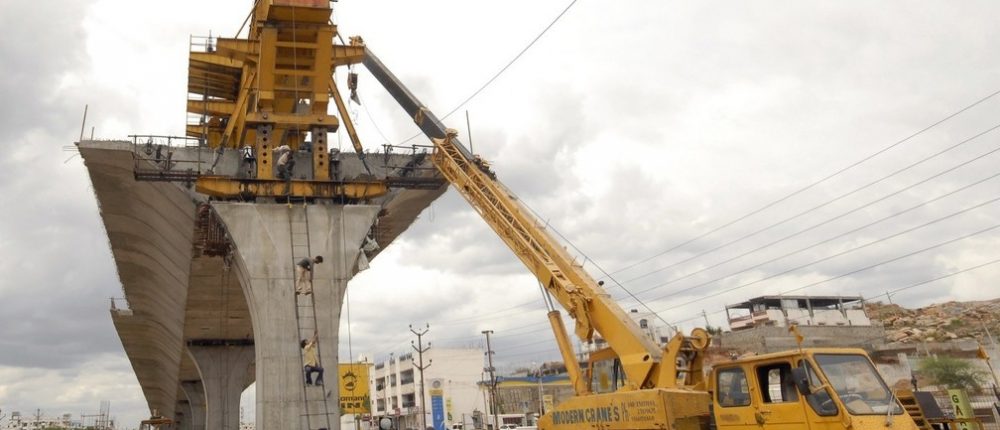The world needs roads and bridges, but first it needs checks and balances
In the 2016 US presidential election, Hillary Clinton and Donald Trump agreed that the American economy was suffering from dilapidated infrastructure, and both called for greater investment in renovating and upgrading the country’s public capital stock.
The United States is not alone. In fact, infrastructure gaps are an even more urgent problem in the rest of the world. Other advanced economies also need to revive moribund investment, and emerging economies need to prepare for population growth, increased consumption, and higher demand for transportation spending.
Initiatives adopted in the aftermath of the 2008 global financial crisis are beginning to promote infrastructure investment. In the European Union, the Juncker Plan – which draws on EU funds to help finance riskier and more innovative projects – aims to generate more than $300 billion in investment between 2016 and 2018.
And there is an even greater push for infrastructure investment in emerging economies – especially China, which is pursuing projects both at home and abroad. In recent years, China has set up domestically funded institutions such as the Silk Road Fund and spurred the establishment of new international financial institutions such as the Asian Infrastructure Investment Bank.
When done well, infrastructure investment can revive flagging economies and pay for itself, by galvanizing private-sector activity and fostering economic growth. But when done poorly, public infrastructure spending can lead to corruption and waste, with taxpayers footing the bill for 'bridges to nowhere'. Properly executed infrastructure investment entails more than just financing; it also requires that all the myriad details of a project’s selection, design, and implementation be closely managed.
And here, the keys to success are not just professional skill and technocratic expertise. They are also transparency and a free press. Citizens should have accurate facts about a project, so that they can monitor its progress and pressure policymakers to protect the public interest.
In a book, Tomas Hellebrandt and Paolo Mauro project that consumer spending on transportation will quadruple by 2035 in Sub-Saharan Africa, India, China, and other emerging Asian countries.
People who earn $200 per year spend only 1% of their income on transportation, compared to 18% for people earning $20,000. In the next two decades, the number of people earning $6,000-20,000 will increase by more than one billion, and many of them will purchase their first car. Meanwhile, the number of people with annual incomes of $20,000+ will increase by almost 800 million, and many of them will begin to fly for leisure.
Transportation networks in emerging economies will have to expand vastly to keep up with this growing demand. And while advanced economies already have extensive transportation infrastructure and stable populations, their networks urgently need renovation and repair.
Emerging countries will be able to muster sufficient financing for infrastructure only if they expand the role of the private sector; pension funds and life insurance companies, in particular, could furnish vast resources. But to capitalise on this opportunity, prudential requirements for such investors must be loosened, so that they can hold diversified portfolios of infrastructure projects. And co-investment platforms with multilateral and regional development banks should be established, to boost the credibility of these investments.
To attract private investors, governments will need to maintain a stable regulatory environment that is free from arbitrary interference. At the same time, they will have to monitor and disclose fiscal obligations from projects that involve private participation, such as what Chile now does routinely. This will help to prevent government guarantees for public-private partnerships from imposing budgetary costs equivalent to one or more points of GDP, as has happened in Colombia, Indonesia, and Portugal.
Governments will need to foster a culture of transparency to ensure that financing is put to productive use – rather than illicitly syphoned off or directed to low-value-added projects for political purposes. Tenders and key contract features should be routinely published, and good record keeping and quality control must be maintained throughout the procurement process and contract performance.
To deter fraud, governments should reward whistleblowers, and protect them from retaliation. Many of the emerging countries where investment is most needed must urgently reform their institutional framework for selecting and implementing infrastructure projects. But corruption afflicts all countries to some extent, so advanced countries also need to protect infrastructure projects from undue private influence and arbitrary official interference.
Successfully boosting infrastructure investment in emerging economies is in everybody’s interest. And with emerging economies now at the forefront of the fight against climate change, the world will benefit even more if investments in these countries are steered toward green-infrastructure projects. Building new metro-railway networks, instead of roads, would help to reduce carbon dioxide emissions for decades to come.
Advanced countries can help in this effort by supporting green-technology research and development, and by providing financial incentives for climate-friendly infrastructure investment through export credit agencies and multilateral and regional development banks. With an open and transparent international procurement system, the most efficient technologies would then come out on top.
Infrastructure investment holds much promise, but to reap its benefits, policymakers in emerging economies will need to strengthen their institutional frameworks for procurement sooner rather than later. And policymakers in advanced economies should preserve and apply well-known checks and balances, to keep the project-selection playing field level, and to permit monitoring implementation from start to finish.
Written by Paolo Mauro, Assistant Director in the African Department at the International Monetary Fund.
This article is published in collaboration with Project Syndicate.
The views expressed in this article are those of the author alone and not the World Economic Forum.
This article was originally published on the Future of Construction Knowledge Sharing Platform and the WEF Agenda Blog
--Future of Construction 14:38, 20 Jun 2017 (BST)
[edit] Related articles on Designing Buildings Wiki
- India needs to build more infrastructure fast. Here's how.
- Jeffrey D. Sachs: Why we need to invest for sustainable development.
- Project controls in a post-BIM world.
- Scoping project approach in the developing world.
- Sustainable development.
- These giant infrastructure projects are set to reshape Africa.
- Two steps towards a more resilient world.
Featured articles and news
Retired firefighter cycles world to raise Grenfell funds
Leaving on 14 June 2025 Stephen will raise money for youth and schools through the Grenfell Foundation.
Key points for construction at a glance with industry reactions.
Functionality, visibility and sustainability
The simpler approach to specification.
Architects, architecture, buildings, and inspiration in film
The close ties between makers and the movies, with our long list of suggested viewing.
SELECT three-point plan for action issued to MSPs
Call for Scottish regulation, green skills and recognition of electrotechnical industry as part of a manifesto for Scottish Parliamentary elections.
UCEM becomes the University of the Built Environment
Major milestone in its 106-year history, follows recent merger with London School of Architecture (LSE).
Professional practical experience for Architects in training
The long process to transform the nature of education and professional practical experience in the Architecture profession following recent reports.
A people-first approach to retrofit
Moving away from the destructive paradigm of fabric-first.
International Electrician Day, 10 June 2025
Celebrating the role of electrical engineers from André-Marie Amperè, today and for the future.
New guide for clients launched at Houses of Parliament
'There has never been a more important time for clients to step up and ...ask the right questions'
The impact of recycled slate tiles
Innovation across the decades.
EPC changes for existing buildings
Changes and their context as the new RdSAP methodology comes into use from 15 June.
Skills England publishes Sector skills needs assessments
Priority areas relating to the built environment highlighted and described in brief.
BSRIA HVAC Market Watch - May 2025 Edition
Heat Pump Market Outlook: Policy, Performance & Refrigerant Trends for 2025–2028.
Committing to EDI in construction with CIOB
Built Environment professional bodies deepen commitment to EDI with two new signatories: CIAT and CICES.
Government Grenfell progress report at a glance
Line by line recomendation overview, with links to more details.
An engaging and lively review of his professional life.
Sustainable heating for listed buildings
A problem that needs to be approached intelligently.
50th Golden anniversary ECA Edmundson apprentice award
Deadline for entries has been extended to Friday 27 June, so don't miss out!
CIAT at the London Festival of Architecture
Designing for Everyone: Breaking Barriers in Inclusive Architecture.
Mixed reactions to apprenticeship and skills reform 2025
A 'welcome shift' for some and a 'backwards step' for others.





























